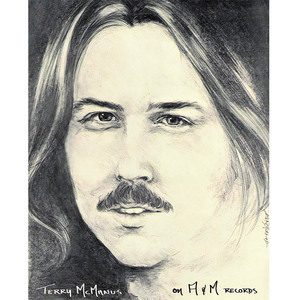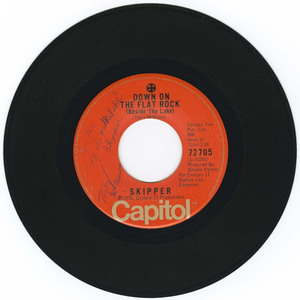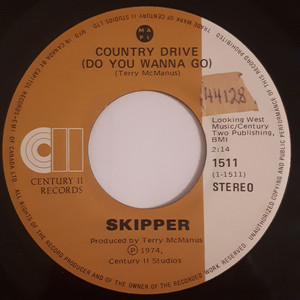Skipper
Websites:
https://www.terrymcmanus.com/
Origin:
Abingdon, England - Toronto, Ontario
Biography:
Terry McManus was born to two Canadian parents but spent a large part of his early life growing up in the United States. He was schooled in Nebraska and by 1967 he was working for a cutting edge computer company in Washington. The extra money he made he socked away to save for recording demos on the side at Bias Studios which, at the time, was home to acts like Nils Lofgren (and his band Grin), Roy Buchanan, George Daly (who would later produce McManus’ first record and later Director of A & R for Elektra Records). After relocating to Canada in 1968 as a staff writer for ARC Records (for projects by Ronnie Hawkins and Anne Murray which never materialized), McManus hooked up with Merv Buchanan’s Trend Records and borrowed a 4-track machine from future Traynor Amps founder Peter Trayner to do some recording. His first release was a song he wrote called “Young Boppers” for the band Fear – featuring future Rush manager Ray Danniels’. McManus drifted between jobs and caught a break when Fred Dixon And The Friday Afternoon recorded his song “Best Believe It” which encouraged McManus to continue pursuing his songwriting skills. However, he couldn’t pay the bills on this small royalty stipend and had to find a real job’. In 1970 he began working for the Ontario Arts Council co-ordinating their pop music program and managed to get Merv Buchanan’s company to do mobile recordings for struggling acts all across Ontario. Part of McManus’ time spent with the Council was organizing the first ever rock concert at Toronto’s Ontario Place Forum. At the same time McManus borrowed $500 from the bank and he and engineer Bill Seddon (Bruce Cockburn) headed into the studio and cut two sides – “Sunshower In The Spring” and “Gimme A Hand” – with Garwood Wallace (who would go to form Twitch) on guitar and John Woloschuk (Klaatu) on bass. McManus did the rounds to try and land a record deal and was rejected by GRT Records but his second attempt landed him a deal with A & M who signed him to a deal over the phone after hearing the songs. The single was released in 1971 which did well on the Canadian charts as did the follow-up singles “Carolyn” and “Love Is Wine” (both from 1972) – all three tunes going to No.1 in the Prairies. An album was recorded but some poor managerial decisions cost him his deal with A & M in 1973. While at the Canadian National Music Conference (run by RPM Magazine), McManus ran into Tommy Banks who was about to start up his own label called Century II and not only signed McManus to his own solo deal but also made him A & R for other acts. Later that year McManus moved from Vancouver to Edmonton to set up shop with the label where he worked with such acts as Russ Thornberry, The Original Caste, and Bim. During this time McManus began recording under the pseudonym Skipper and released the single “Down On The Flatrock” for Capitol Records in 1973. The remainder of his material alternated between his real name and alter-ego for Century II (which was also distributed by Capitol). McManus would also be responsible for discovering the acts Sylvester Stretch and Val Hudson (who had a modicum of success when Karl Erickson recorded her song “Stormy Grey”). Lenny Breau would also record with McManus in 1974. By 1975 Century II began to collapse and McManus found an ally in old recording associate Bruce Sperling who took McManus to New York and hooked him up with a manager, lawyer and publishing deal with a publishing company run by George David Weiss (“I Can’t Help Falling In Love” and “It’s A Wonderful Life”). Nothing of any importance came out of the association and McManus found himself looking for a full-time day job later that year. He began teaching at Fanshawe College in September 1975 and has been there ever since. In 1976 another of his songs, “What A Day”, was recorded by the Vos Family and used in a promotional campaign to raise funds for the 1976 Montreal Olympics. Around this time McManus began writing children’s songs for his estranged son in California and on a lark, forwarded the material to Raffi’s label Treble Clef. They liked the material so much that a children’s album, ‘Scrub-A-Dub U.’, materialized at about the time that Treble Clef went out of business and McManus found his material on A & M Records once again. During an appearance at the Hamilton Folk Festival in 1979 McManus made the acquaintance of children’s performers Bob Schneider and Fred Penner. He and Penner hit it off well and McManus eventually found his songs appearing regularly on Penner’s children’s TV show starting the mid-80’s. In 1981 McManus was asked by London promoter Don Jones to perform an opening set of material to entertain children at Mr. Dressup appearances. With McManus’ experience in music legalities he was able to help Mr. Dressup (Ernie Coombs) get out of a bad recording contract and the two hit it off working on their own material together. The result was the 1982 album ‘Wake Up Mr. Dressup With Friend Terry McManus’ which was released on A & M and led to a tour by the duo. By 1985 Access TV in Calgary approached McManus to write material for their kids’ show the Magic Ring’ which resulted in 81 songs being used in 39 shows from 1985-1991. Around the mid-80’s McManus teamed up with music lawyer Stephen Stohn and Donna Murphy to revive the long defunct Songwriters’ Association Of Canada to which McManus was elected president for 4 years before becoming Chairman Of The Board. In 1986 McManus wrote lyrics to an existing Rick Wakeman song called “Heather Carpets” which he re-christened “Heathered Hills”. Wakeman and his publishing company liked the version so much they gave McManus future songwriting credit should the song ever be re-recorded. In recent years McManus has been writing essays published in the Globe & Mail out of Toronto, managing a new a cappella vocal group The Essentials, a rock group called Blend, helping aspiring country acts Kortney Kale, Greg Hanna and Deric Ruttan. In 1997 Billboard Magazine published a year-end essay by McManus on the importance of singles. McManus is currently in the studio working on a new solo song called “Missing John” about the late John Lennon.
-Terry McManus, Merv Buchannan and Garwood Wallace.




